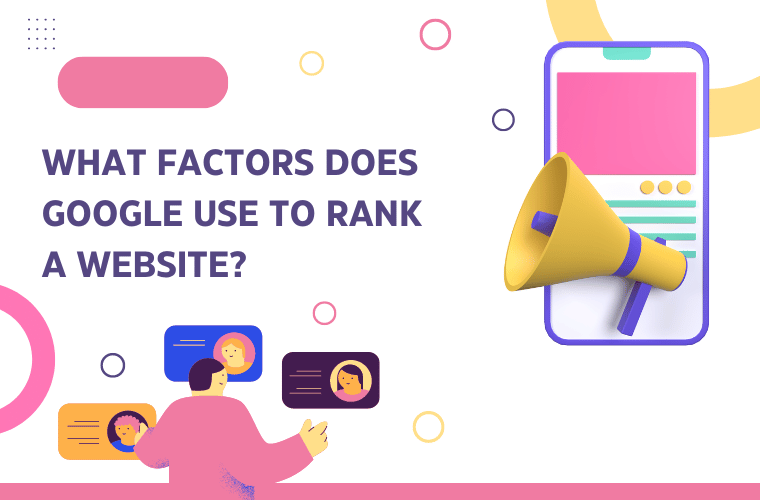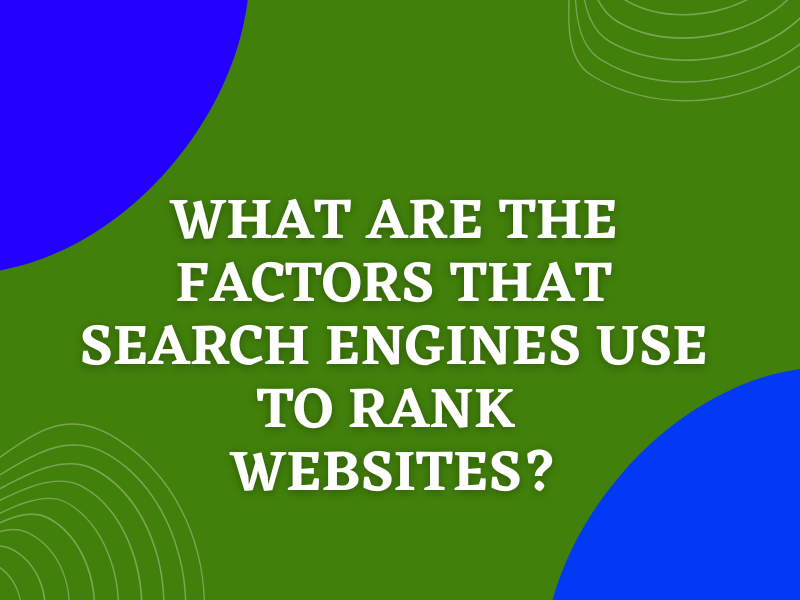What are the Factors That Search Engines Use to Rank Websites?
Many factors search engines use to rank websites. Some of the more important factors include the quality and quantity of backlinks, the domain’s age, the keywords’ relevance, and the content’s freshness.
Many factors search engines use to rank websites. The most crucial factor is the quality of the content. A website with high-quality, informative content will be more likely to rank higher in search results.
Other important factors include the number of backlinks from other websites, the website’s age, and whether or not the website is mobile-friendly.
What Factors Does Google Use to Rank a Website?

Google uses a variety of factors to rank websites in its search engine results pages (SERPs). These factors are constantly changing and evolving, so it’s difficult to say definitively which ones carry the most weight. However, some of the more critical factors that are known to influence Google’s ranking algorithms include:
The quality and quantity of a website’s backlinks: Backlinks are links from other websites to your website. Google views these as “votes” for your site; the more votes you have, the higher your site will rank. However, not all backlinks are created equal.
Google gives more weight to backlinks from high-quality websites that are relevant to your topic than it does to low-quality or irrelevant sites. In addition, the anchor text (the words used in the link) can also influence rankings; keywords in the text tell Google what your page is about and can help it rank higher for those terms. -A website’s on-page content: The actual text on your web pages also affects your rankings.
Google looks at keyword density (how often specific keywords appear on your page), title tags, meta descriptions, header tags, etc., to determine what each page is about and how relevant it is to specific searches. Making sure you have well-written, keyword-rich content on your site is crucial for getting good rankings. A website’s loading speed and mobile friendliness: In recent years, Google has increasingly emphasized user experience when ranking websites.
This includes website loading speed and mobile friendliness; if users can’t easily access and use your site, then they’re unlikely to stick around or come back in the future.
What Do Search Engines Use to Rank Web Content?
Search engines use a variety of factors to rank web content. These include the quality of the content, the relevance of the keywords used, and how popular the site is. Each search engine’s algorithm is different, so it’s difficult to say precisely what they’re looking for.
However, creating high-quality, relevant content makes you more likely to rank well in search engines.
What are the Top 5 on Page SEO Factors?
If you want your website to rank highly in search engine results pages (SERPs), you need to focus on your on-page SEO. This refers to all the elements on your website that affect your ranking, including your content, title tags, meta descriptions, header tags, and more. To help you out, we’ve compiled a list of the top five on-page SEO factors:
1. Title Tags
Your title tag is one of the most important on-page SEO factors. It tells search engines what your page is about and appears in SERPs as the main headline for your listing. Ensure to include relevant keywords in your title tag and keep it under 60 characters so it doesn’t get cut off in SERPs.
2. Meta Descriptions Another crucial on-page SEO factor is meta descriptions.
These are brief snippets of text that appear below your title tag in SERPs and give users an overview of what they can expect from clicking through to your page. Again, include relevant keywords and keep it under 160 characters, so it doesn’t get cut off.
3. Header Tags (H1s)
Header tags structure your content into sections with headlines (H1s being the biggest). They help users and search engines better understand the hierarchy of information on your page. When creating header tags, ensure they accurately reflect that section’s contents and include relevant keywords where applicable.
4. Content quality & keyword targeting
Of course, no matter how well optimized your titles, meta descriptions, and header tags are, if your content isn’t good, then people aren’t going to stick around for long – which will hurt both your user experience metrics and rankings. That’s why high-quality, well-written content that provides value is crucial for good Rankings.
In addition to being informative and interesting, your content needs to be targeted appropriately toward specific keywords you want to rank for.
5. This includes using those keywords
Throughout (in a way that sounds natural ) and adding them into titles, headings, and other places where appropriate. However, don’t go overboard with keyword stuffing; if done excessively, this can result in lower rankings due Search Engine Optimization penalties from Google.
Most Important Google Ranking Factors
Google’s algorithm is a closely guarded secret, and the company does not release detailed information about the factors that go into its ranking system. However, based on years of experience and research, we know that certain vital factors significantly impact your website’s ability to rank well in search results. Here are the most important Google ranking factors:
1. Relevance One of the most critical factors for ranking well in Google search results is relevance. Your website must be relevant to the keywords people are searching for if you want to rank high on the results pages.
That means using those keywords throughout your site, including title tags, meta descriptions, header tags, and content. In addition, your site should be appropriately categorized and tagged so that Google can understand what it’s about and match it with relevant queries.
2. Authority
Another critical factor in Google’s ranking algorithm is authority. Websites with solid power levels rank higher than those without as much control. Several ways to build authority for your website include:
- Creating quality content.
- Earning links from other reputable websites.
- Being active on social media platforms.
The more authoritative your site appears, the better your chance of ranking high in Google’s search results.
What are Ranking Factors
A ranking factor is a piece of data used by search engines to determine where a website should appear in the search engine results pages (SERPs). Many ranking factors are constantly changing as the algorithms that power search engines evolve. Some of the most important ranking factors include the quality of the content on a page, the number of other websites linking to that page, and how long visitors stay on that page.
To understand how ranking factors work, it’s essential first to know how search engines work. When someone types a query into a search engine, the machine uses an algorithm to scour the internet for content that is relevant to that query. The algorithm looks at various pieces of data – including ranking factors – to determine which websites should appear in the SERPs.
The sites deemed most relevant will appear higher on the list. There is no definitive answer regarding what search engines look at when ranking websites. However, there are some commonalities among all of them:
They want websites with high-quality content that is relevant to what people are searching for They want websites with lots of links from other reputable websites -They want websites where people spend time (this indicates that visitors find what they’re looking for on these sites)
While there is no magic recipe for getting your website to rank #1 on Google, understanding how ranking factors work can help you create content and design your site in a way that makes it more likely to show up high in the SERPs.
Which Choice is a Ranking Factor
Search engines consider many factors when determining which websites to rank in their search results. One of those factors is the choice of website hosting. While many different hosts are out there, not all of them are created equal.
Some choices can hurt your ranking rather than help it. Here’s what you need to know about choosing a website host as a ranking factor. The first thing to understand is that not all website hosts are treated equally by Google and other popular search engines.
Certain types of hosts tend to get penalized more than others. For example, search engines often look down on free web hosting services because they’re usually associated with low-quality websites. Likewise, shared hosting plans can also be problematic since your site could be affected by the actions of other sites on the same server.
That said, there are still some good options for those who want to use shared or free hosting services. Remember that your site may have a more challenging time ranking well if you choose one of these less-than-ideal hosts. On the other hand, if you want to give your site the best chance possible at ranking well, then you should choose a quality web host such as WP Engine or SiteGround.
These companies offer reliable service and fast speeds, which are important factors for SEO success. Plus, they don’t typically allow low-quality sites on their servers, so you won’t have to worry about being penalized by the association. In short, when choosing a website host, remember that quality trumps quantity.
Spending a few extra dollars per month on a quality host will pay off in the long run with better rankings and more traffic.
Top 3 Ranking Factors Google

Google is constantly changing and updating its algorithm, making it challenging to keep up with the latest ranking factors. However, some key elements have remained consistent over the years and are essential for any business wanting to rank high in Google searches. Here are the top 3 ranking factors:
1. Relevance
The most crucial factor for ranking high in Google is relevance. Your website must be relevant to the keywords that users are searching for.
This means having quality content that naturally includes those keywords. Simply stuffing your content with keywords is not enough – your site will be penalized for keyword stuffing. Instead, focus on creating quality content that uses your target keywords throughout.
2. Authority
Another critical factor is authority. Google wants to provide its users with the best possible results, so it favors websites that are seen as experts in their field.
You can build authority by getting quality backlinks from other websites and ensuring your own site is well-designed and easy to navigate. Creating informative blog posts and articles can also show Google that your site is an authority on your chosen topic.
3 Links
Finally, links are still a significant factor in ranking high in Google search results pages (SERPs). Quality links from other websites show Google that your site is popular and trustworthy – both essential qualities if you want to rank highly!
Ranking Factors in SEO
It’s no secret that ranking factors in SEO are constantly changing. However, there are a few key factors that have remained consistent over the years and continue to be important today. Here are some of the most important ranking factors in SEO:
1. Keywords are still one of SEO’s most important ranking factors. Your website needs to be optimized for the keywords you want to rank for, and you need to include those keywords throughout your site – in your titles, headings, meta tags, etc.
2. Links Links from other websites are a significant factor in SEO. The more high-quality links you have pointing to your website, the higher your site will rank in search engine results pages (SERPs). Link building is an essential part of any successful SEO strategy.
3. Content Content is still king when it comes to SEO. Your website needs high-quality, relevant content if you want it to rank well in search engines. Your content should also be keyword-optimized and easy for users to read and digest.
Which is Not an Important Aspect of How You Set Up Your Website to a Search Engine?
There are a few things that you should not do when setting up your website to make it search-engine friendly. One thing you should avoid is using Flash animation or images. While these can be visually appealing, they are not read by search engines and therefore provide no SEO value.
Additionally, you want to ensure that your site navigation is easy for users and search engines to understand. Creating a sitemap can help with this. Finally, resist the urge to stuff keywords onto your pages – this will result in lower-quality content that doesn’t provide value for your readers.
Which of the Following Factors Does a Search Engine Use to Rank Results? Select All That Apply.
It’s no secret that search engines use complex algorithms to rank results. But what factors do these algorithms take into account? Here are some of the most critical factors that a search engine uses to rank results:
1. Relevance One of the most critical factors a search engine considers is relevance. When you perform a search, the search engine looks for websites that are relevant to your query.
The more relevant a website is, the higher it will be ranked in the search results.
2. Authority Another vital factor a search engine looks at is authority.
Things like inbound links and social signals determine authority. If other websites and people are linking to a particular website, the website is seen as an authority on the topic. And the more authoritative a website is, the higher it will be ranked in the search results.
Describe the Factors That Can Positively And Negatively Affect How a Search Engine Ranks a Website
Search engine ranking is determined by several factors, both on-page and off-page. On-page factors include things like your website’s content, your website’s structure, and the keywords you use. Off-page factors include things like inbound links and social media signals.
Both positive and negative factors can affect your search engine ranking. For example, if you have a lot of high-quality inbound links pointing to your website, that will generally be a positive signal to search engines and help improve your ranking. However, if you have a lot of low-quality or spammy inbound links pointing to your website, that could be a negative signal to search engines and hurt your ranking.
The best way to improve your search engine ranking is to focus on creating high-quality content relevant to what people are searching for. If you can do that and also make sure your website is easy to navigate and uses appropriate keyword targeting, you’ll be well on achieving better rankings.
Conclusion
Search engines are constantly changing the algorithms they use to rank websites. However, some factors remain constant. These include the quality of your content, the number of high-quality links pointing to your site, and how user-friendly your site is.
Search engine optimization (SEO) is ensuring your website meets all of the criteria search engines use to rank sites.







